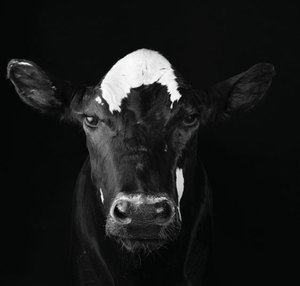Humans Continue to Desperately Cling to Meat

Thanks, Bea, for directing me to "Carnivores Like Us," by Paul Roberts in Seed Magazine, which could be called, "Humans Continue to Desperately Cling to Meat." The article is seven pages, five of which contain information you already know, such as the global market for animal products is increasing as developing nations grow in wealth and population. There’s a brief explanation of the resources required to produce animal products, and "because meat represents such a concentrated use of resources, it has now forced a debate over the future of food—a debate that is beginning to reveal the flaws in an economic model premised on endless growth."
Roberts continues:
In a strange way, such bleak forecasts bring a welcome clarity to a discussion long confined to the margins of society. For decades, anyone who argued that humans should be eating less meat, or none at all, did so largely on moral grounds such as animal rights, or for religious reasons—arguments that the rest of society was free to ignore.
But now that science has shown us that we should be eating less meat for our health and the environment, the moral imperative begins to matter (though not for the sake of the animals).
Roberts continues:
Interestingly, even as science has revealed how necessary meat was in our past, science has also shown how dispensable meat is today. A full-grown, active man could thrive for a month on what the typical American eats in a week—or on no meat at all, as millions of vegetarians prove every day. Indeed, nearly 100 years ago, government researchers in the then-new field of nutrition discovered not only what it is about meat that the body needs—protein, for example, and micronutrients such B-12—but also how most of those beneficial components can be obtained elsewhere.
He then makes an unfortunate comment within an otherwise okay thought:
Today we know that certain food combinations, like rice and beans, will provide the same complement of amino acids as are found in meat, and that the soybean, a Chinese transplant, contains a complement of proteins nearly as complete as an animal variant.
The rice-and-beans mantra of food combining is so 1980s.
You’d think that with all of the evidence that keeps piling up regarding how detrimental animal-based agriculture is to the planet and how easy it is to live a healthy life without animal products, we’d be reaching different conclusions. But what we can always count on, what we’ll always come back to regardless of the mounds of evidence we’re drowning in, is that we simply don’t want to give up our meat.
As Roberts explains/rationalizes:
[T]he discipline of "meat science," traditionally focused on generating the most meat for the least cost, must organize itself around a fundamentally different set of questions. How much meat can the world sustainably produce? How little meat do humans actually need? And are there ways to produce meat, or meat protein, or protein with similar biochemical characteristics, without such high external costs?
And after describing alternatives to the way we currently produce our animal products, he writes:
The bad news is that any attempts to transform our meat culture will raise the same kind of moral storm that surrounded such controversies as second-hand smoke and seatbelt laws. The good news is that we won’t be arguing for change on moral grounds alone.
The good news is that we won’t be arguing for change on moral grounds alone.
I have two thoughts: (1) It’s an unfortunate reality that moral grounds aren’t enough to change the way people behave, and (2) the analogy with second-hand smoke and seatbelt laws doesn’t hold, as someone is necessarily killed for meat. Second-hand smoke and seatbelt laws are about protection, and the only way to protect animals from harm is to not harm them. When are we going to face that simple fact?



